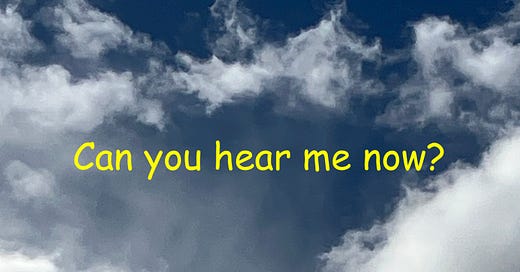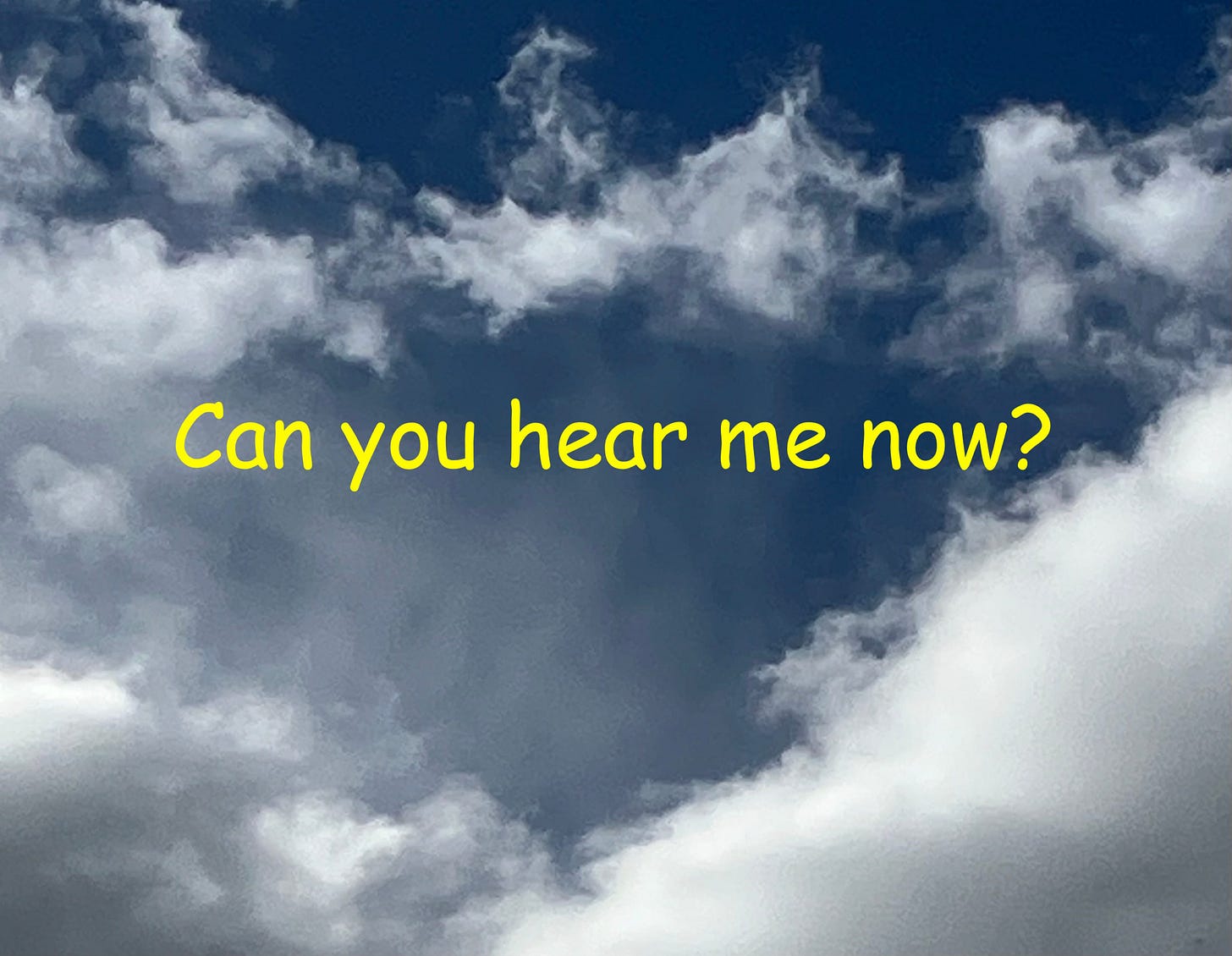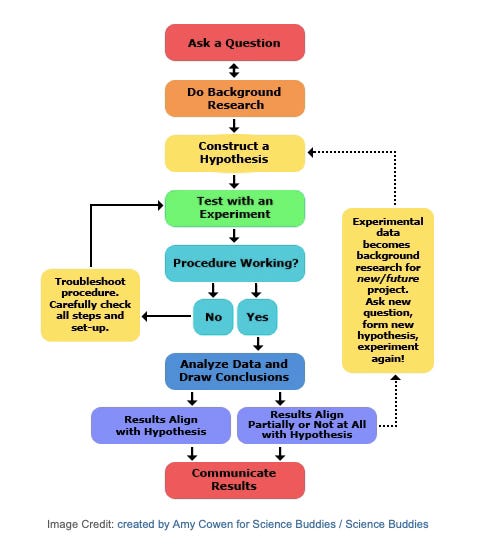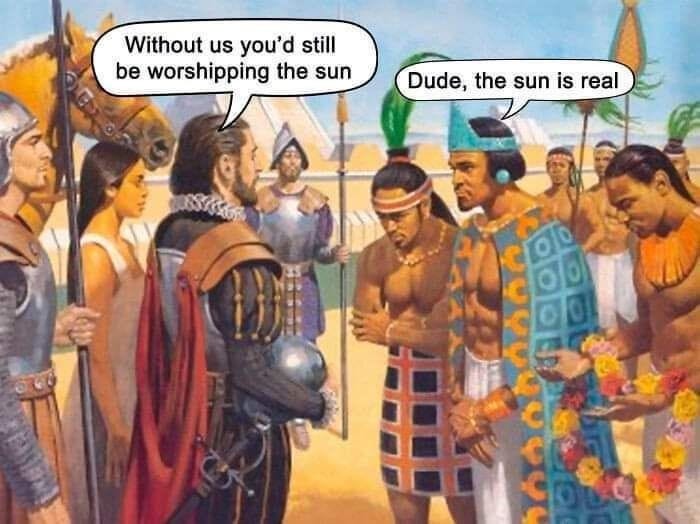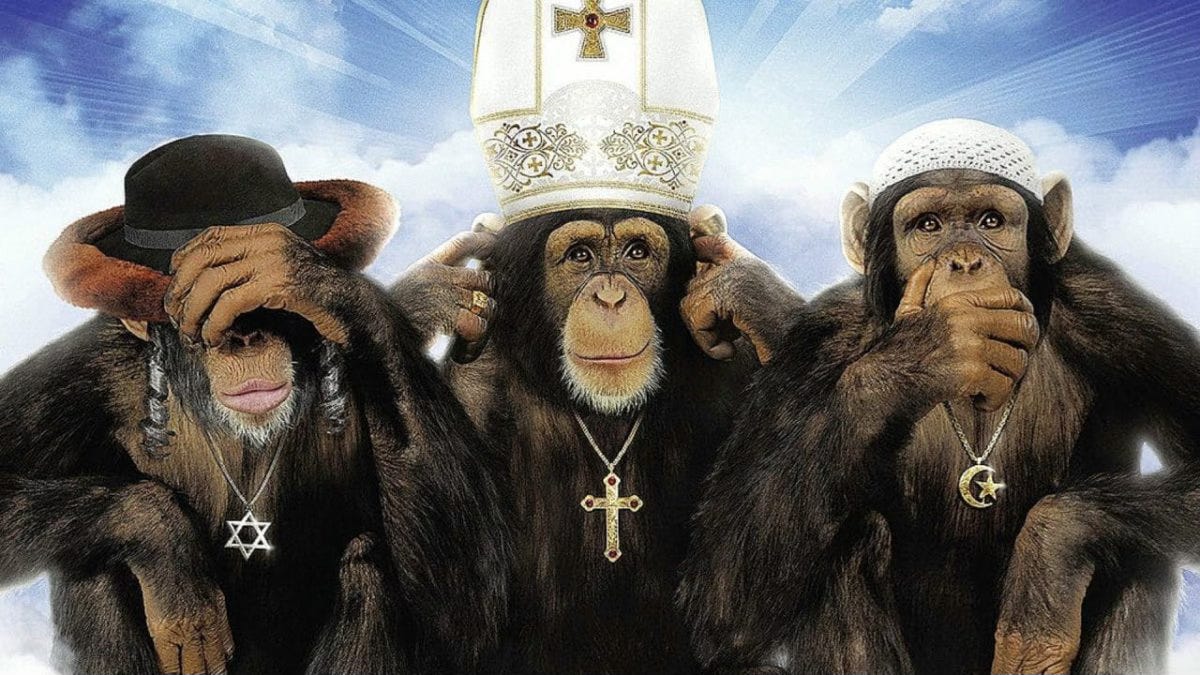UPDATED: February 28, 2025
Welcome to the Healthy Living Is Good Medicine Newsletter, a free publication covering a wide variety of health-related topics, with timely original articles intended to help people lead healthier and more fulfilling lives.
Is Science Compatible with Religion?
The fact that some scientists can also be religious is not a testament for there being a compatibility between science and religion. Just because a brilliant scientist such as Francis Collins can also be an evangelical Christian, that only serves as further evidence for a phenomenon first noted by Sigmund Freud. It never ceased to amaze Freud how the rational and irrational could dwell side-by-side in the same mind without apparent conflict.
Compartmentalization is a psychological defense mechanism that allows conflicting beliefs, values, concepts, emotions, and memories, as well as behaviors that are at odds with one’s beliefs, to remain separated in one's mind. This subconscious mental strategy allows people to avoid the anxiety that can arises from cognitive dissonance.
While religions can create communities and provide some people with a greater sense of purpose, its allegations of rewards and punishments in the afterlife have lead to a lot of unnecessary suffering in the one they already have. At patients’ bedsides, I helplessly witnessed the mental torment and extreme anguish of people imagining the torments awaiting them in Hell, should they not pass muster at the Pearly Gates. There was nothing I could do or say that would bring them comfort.
For some, believing they have a spiritual connection may give them comfort when dealing with a terminal illness. However, comfort can also come from having a secular sense of meaning and purpose in life. There are other ways to experience a transcendent state of consciousness when facing one’s impending death, facilitated through meditation or with psychotropic drugs such as psilocybin, ketamine, and MDMA, administered as part of a patients’ palliative care.
Nothing Fails Like Prayer
When two sports teams pray before the big game, is the winning team’s victory evidence that God is their bigger fan? Might winning have more to do with skill and luck than divine intervention? Rhetorical questions, to be sure. When people pray, some of their prayers might appear to be answered, and others not. Are the results of praying more predictable than a coin toss?
A multi-center, randomized trial investigated the effects of receiving intercessory prayer upon the outcomes of patients recovering from coronary artery bypass graft surgery. The study concluded that intercessory prayer itself had no effect upon a complication-free recovery from surgery. However, patients knowing that they were receiving prayers had a higher incidence of post-operative complications.
A randomized, double-blind clinical trial on remote intercessory prayer performed for patients hospitalized with COVID-19 had a primary endpoint of in-hospital mortality. Secondary endpoints included the need for mechanical ventilation during hospitalization, duration of mechanical ventilation, and length of ICU and hospital stays. The study found no evidence of an effect of intercessory prayer on mortality or any of the secondary outcomes.
Just to be clear, despite popular religious beliefs about the power of prayer, scientifically conducted studies have shown that intercessory prayer has no effect on surgical outcomes, mortality rates, or length of hospitalization. In other words, nothing fails as blatantly as prayer, when scrutinized by science. When has prayer ever restored the limb of an amputee? No such miracle!
According to a BBC News article, an eight-year-old Australian girl with diabetes was found dead after being denied her insulin injections. Instead, with urging from members of their church, her parents just prayed for her healing. Three years later, 14 adult church members were found guilty of manslaughter. In this case, prayer’s failure was fatal.
From a statistical perspective, what appear to be answered prayers are coincidences, due to random chance. You can flip a coin 10 times and have it come up heads every time, but praying over it won’t produce that statistical anomaly. There is absolutely no evidence for a causal relationship between prayer and its desired outcome. As a physician, I have felt frustrated with patients who chose to unsuccessfully pray for their healing, rather than undergoing recommended treatments, even after suggesting that they pray for God to guide the hands of their surgeon.
What is Science?
Science was never intended to be a static body of knowledge, or an endeavor that dictates human values, although value-driven, observable behaviors are a legitimate area for scientific inquiry. Science is a way of thinking about the nature of things. In practice, it involves a rigorous analytical process that uses logical reasoning to produce testable interpretations of empirical evidence. Regardless of the field, science is about a formal approach to learning about the world around us.
The meaning behind the word itself has changed, and the concept of what it is for something to be considered a science has evolved. We now have “political science” and the “social sciences” staking out their claims on the word’s territory. Now, physics, chemistry, biology, and astronomy must distinguish themselves for the “soft sciences” that don’t allow for the same degree of precision and rigor.
Rather than “science” simply being a collective term for a particular type of intellectual pursuit, in the eyes of the public science has become an institution. Most people don’t have an accurate understanding of what science actually is, because educators and spokespersons have failed to set realistic public expectations regarding science’s strengths and weaknesses.
Consequently, “Science” with a capital “S” is now widely misunderstood by many people as being an infallible doctrine with an inherent ability to solve all our problems. At the same time, many others deride science, taking any of its mistaken conclusions as a sign of its total failure, instead of recognizing that correcting inevitable mistakes is part of its ongoing process.
For the most part, the conclusions reached by science are only temporary. They will eventually be superseded by more accurate interpretations of the evidence, as more observations are made, more experiments are performed, and more data is acquired and analyzed. Incremental improvements in scientists’ understanding will be repeated again and again, over time.
The Scientific Perspective
Science is grounded in a default skepticism, and eschews dogma. Its materials and methods have been honed over centuries for experimentally testing the null hypothesis, which states that a statistically significant relationship among the variables under study doesn’t exist. In practice, scientific research employs specific tools to formulate provisional explanations.
The aim of science is to help people better understand the physical universe in all of its aspects. The spectacular achievements made possible by science have generally resulted in people's lives being easier and healthier, despite the obvious harms inflicted by the use of science and technology in warfare and some of its authoritarian implementations to control populations. The scientific perspective offers a number of invaluable benefits:
Objectivity: It strives to remove personal biases and emotions from observations and analysis, focusing solely on empirical evidence.
Reliability: Scientific methods are designed to be repeatable, allowing others to verify findings and build upon them.
Predictability: Through scientific understanding, we can make predictions about future events based on established patterns and laws.
Critical thinking: The scientific perspective fosters critical thinking skills, enabling us to evaluate information and arguments objectively.
Problem-solving: By applying scientific principles, we can develop solutions to real-world problems, improving quality of life.
Progress: The scientific method encourages continuous inquiry and discovery, leading to advancements in knowledge and technology.
Science’s Perpetual Discoveries Require Perpetual Learning
As graduation time in medical school approached and we were about to become practicing physicians in post-graduate training programs, a professor reminded us that in ten years we will have forgotten half of what we learned in medical school, and the other half would no longer be correct. That’s why doctors need continuing education about the latest advancements in medical science, in order to give their patients the very best care possible.
The Rise of Anti-Science Attitudes
There’s a particular anti-science segment of society that will loudly assert that “Science doesn’t have all the answers!” Well, I totally agree with that, and so do any scientists worthy of the title. My counterpoint is that science has come up with enough good answers to make life, for a whole lot of people, a whole lot better. Science has made many contributions to our understanding of the natural world, and provided society with the basis for marvelous technological and medical accomplishments.
The failure of public schools to teach critical thinking skills and scientific literacy, especially at a very young age, might partially explain the 2023 Pew Research Center survey finding that positive views of science among Americans have fallen, along with a continued decline in the public's trust of scientists. Declining levels of trust in medical scientists have been particularly pronounced among Republicans in recent years. Here’s what science has done to earn people’s trust:
Contributing to America's anti-science attitudes are fundamentalist religious sects that believe morality requires religion, and equate science with godless immorality. Rejection of science and a mistrust of scientists and physicians doesn't prevent religious fundamentalists (with the exception of “Christian Science” followers) from seeking medical help when sick or injured.
America's unique egalitarianism and the misinformation quagmire of social media contribute to the distrust and denigration of scientific authorities. For example, Dr. Anthony Fauci, esteemed by his colleagues, has been reviled by ignoramuses in the public and political sectors (MTG, for example).
In the level playing field of cyberspace, everyone is equally entitled to their opinion, regardless if it is factually incorrect or how asinine it seems. Lizard people, harvesting adrenochrome, Democrats controlling the weather, microchips in mRNA vaccines... the list goes on. Yikes!
Widespread anti-science attitudes among the poorly educated and misguided members of the American populace can have real-world consequences. Elected officials may become less inclined to appropriate funding for scientific projects and basic research. Scientists who publish unpopular conclusions risk death threats.
The necessity of science for a vibrant economy and healthy population has never been greater than now. Countries that make big investments in science reap the rewards, while those that don't decline in wealth and influence. Isn't it time to make America smarter again?
The Need for Honesty and Transparency in Science
The ideals of a self-governing democracy hold that elected representatives and appointed officials should be truthful, and that the workings of government at all levels should be fully transparent, of they are to deserve our trust, respect, and support. So should it be with science.
If we are expected to follow the recommendations of scientists and medical doctors, they must be completely honest with us. It would also help if they conveyed a degree of humility when communicating with the public, rather than an air of superiority entitled by their credentials and expertise.
Experts in the scientific and technical fields that impact our lives need to be held accountable for their ethical transgressions and when they conceal their conflicts of interest, personal biases, and professional limitations. Truth and transparency are crucial if we are to accept judicial rulings and professional recommendations.
Science-Based Medicine
I am a physician with a graduate degree in biology and science education, and have a special interest in how science can be best applied to the practice of medicine. The vast majority of medical doctors aren’t trained as scientists. Special training in how to do research and publish studies isn’t included in a medical school’s curriculum.
The education of physicians is guided by reputable studies published by scientists doing medical research. Unfortunately, there is no such thing as a “perfect” study. Well-done studies acknowledge their limitations and disclose conflicts of interest. While major flaws in research typically result in the rejection of manuscripts by reputable journals, and minor flaws are met with demands for revisions, there are still errors that can get through. Publications may require that an article be revised or retracted, after those errors are discovered.
A key to understanding the value of any study lies in knowing the statistical significance of its results. Researchers have to ask themselves, how likely is it that these findings are not due to chance alone? Assuming that a study is not fraudulent and has no confounding variables that weren’t accounted for, no biases, and no inappropriate methods, random chance can still play a role and must be factored into an analysis of the results. In reality, there are always potential sources of error, and a doing useful statistical analysis becomes quite complicated. Consequently, bio-statisticians are key players when conducting high-quality medical research:
When experimentally testing a treatment in a clinical trial, the results are considered to be “statistically significant” if at least 95 percent of the time the outcome with treatment, when compared with no treatment or a placebo, is more pronounced than what random chance alone would produce if the treatment was actually ineffective. Because there is never 100 percent certainty, the results of legitimate scientific studies must be expressed in terms of probabilities and levels of confidence, rather than absolutes.
The wonderful thing about science is that it continually corrects itself along the way. Rather than being a collection of unchanging “truths,” science is an unending process of progressively improving our understanding of how things work, based upon independently verifiable evidence gathered by competent researchers who strive for objectivity. After a number of high-powered, randomized, controlled trials have been published, and there have been systematic reviews and meta-analyses corroborating the findings, it is only then that medicine’s clinical practice guidelines are updated.
Science’s Limitations
Science does not create moral or ethical rules, values, laws, or judgments. It is up to society to create those for itself. Although the information provided by science can help society make those decisions, science cannot make such decisions for society. Neither should religion. What would life be like for Christians living under Sharia Law?
Science can’t prove that space-time and matter-energy exist in a reality outside it’s own theoretical framework. Their reality is taken as axiomatic, a starting place for further inquiry. If this is hard to understand, I recommend learning more about the foundations of science. Being a good citizen in a secular society requires having enough scientific literacy to make the best use of the information that science can provide.
Our current election cycle has seen a proliferation of mail-bots spewing political propaganda, and social media populated with deep fakes and fake news, all of which have been facilitated by advances in computer technology and artificial intelligence (AI).
As AI continues to rapidly evolve with scant government oversight, one can only wonder if it will be a blessing or a curse? That’s a question science can't answer. It will fall upon those extremely rare honest politicians who possess critical thinking skills, and have the ability to navigate the safest course for the future of society. Perhaps that’s expecting too much.
The Separation of Science and Religion
Because of the amazing things it has accomplished, such as taking people to the moon and back, and giving much of humanity the ability to almost instantly communicate with someone else on the other side of the planet, for some people science has inspired a kind of reverence that it does not want, or deserve.
Perhaps the biggest misunderstanding about science is thinking of it as a religion, with scientific laws as its scripture, and scientists as its clergy. However, in sharp contrast to religion, science doesn’t require taking anything on faith. Instead, it invites challenges to its over-arching laws and theories, and provides a rational framework for understanding the world, based upon rigorous experimentation, independently verifiable factual evidence, and precise mathematical data analysis.
Science doesn’t pretend to be an instrument for humankind’s salvation. It is only a method of inquiry that can be used for better, or for worse. The scientific perspective isn’t the only way to view the world, but it is the most honest and useful one for maximizing the well-being of as many people as possible, and for creating a better informed and more progressive society.
Unlike religion, science demands extraordinary proof to support any extraordinary claims. Science also makes pertinent discoveries by asking impertinent questions, something that religion discourages. Philosophers ask questions that might not have answers, while clerics provide answers that must not be questioned. In contrast to both, scientists suggest probable explanations that are provisionally supported by objective facts, and are capable of falsification through the acquisition of new data.
A Thought Experiment
“Are humans created in God's image, or has the human ego created an image of God that resembles humans?” As a thought experiment, compare and contrast how a philosopher, a theologian, and a scientist might answer this question.
It seems that constructing a loving God who takes a personal interest in you would be a rather ego-centric endeavor, something that would make you feel very special and important. The downside, of course, is being under constant scrutiny, to determine if you’re being naughty or nice, with there being some really nasty punishments in store for you if you break any of the rules and fail to adequately repent.
The promise of having a wonderful eternal life after death can be an irresistible attraction for many religious followers. What could be more appealing to poor peasants than walking upon the streets of Heaven, paved with gold? Glory!
Epistemological Differences
There are some very significant epistemological differences between science and religion. Epistemology is the study of how we arrive at an understanding of what we believe to be true. It makes an important distinction between knowledge that is acquired by reasoning from verifiable evidence, and that which comes from the unquestioned acceptance of things that people are taught to believe.
It should come as no surprise that most religious people follow the same religion as their parents, although they weren’t born that way. Tenaciously holding on to erroneous beliefs is the epitome of epistemic failure. Being willing to change what we believe requires epistemic openness, while being closed-minded is the opposite.
To free oneself from the prison of false and limiting beliefs, the first step is to examine how we came to believe what we think is true. Being entirely honest with oneself is powerfully therapeutic, but that kind of introspection and reflection takes courage. Are you brave enough? As Freud observed, “Most people do not really want freedom, because freedom involves responsibility, and most people are frightened of responsibility.”
The Conflict Between Science and Religion
Science and religion need not engage in mortal combat, but a good argument can be made for keeping them separate, because their differences make them mutually incompatible. This is especially apparent when it comes to how they diverge when describing and explaining the natural world. Science seeks to explain “how,” while religions tell people “why.” Science provides provisional explanations based upon the best evidence currently available, while religions make irrefutable “truth” claims.
Astrophysicist Neil deGrasse Tyson makes no bones about it: “Let there be no doubt that as they are currently practiced, there is no common ground between science and religion…. Whenever people have used religious documents to make accurate predictions about the physical world they have been famously wrong…. I simply go with what works.” Tyson is adamant about keeping religion out of science classrooms.
Religion cannot claim an exclusive dominion over human values and morals, although adherents would certainly like that. The concept of non-overlapping magisteria has been challenged by a number of free-thinkers. For example: “Meaning, values, morality and the good life must relate to facts about the well-being of conscious creatures – and, in our case, must lawfully depend upon events in the world and upon states of the human brain.” ~ Sam Harris, in “The Moral Landscape: How Science Can Determine Human Values.”
There is simply no common ground between fact-based science and faith-based religion. The uncritical, unwavering faith demanded by religion is the very antithesis of science's provisional interpretations of the evidence, based upon a preponderance of objective, independently verifiable empirical data, and arrived at through rational analysis and logical reasoning. Science textbooks are always subject to revision, while religious scripture is not.
Although the National Academy of Sciences has adopted the position that science and religion occupy two separate realms of human experience with no overlap, the fact remains that religion tries to insinuate itself in scientific matters by making existence claims.
If those who advocate against abortion on religious grounds claim that a new soul is created when a spermatozoan penetrates an oocyte, it should be incumbent upon them to provide credible evidence for the existence of a soul. Absent that evidence, such claims should be immediately dismissed. Freezing a baby would kill it. Freezing an early embryo preserves it. Ipso facto, they are not the same!
How Religion Harms Health
While religion can potentially offer comfort and let people cling to hope in times of trouble, it can also have negative impacts on people's physical and mental health and sense of wellbeing. As Nobel laureate Steven Weinberg noted, “With or without religion, you would have good people doing good things and evil people doing evil things. But for good people to do evil things, that takes religion.”
Tragic evidence supporting that conclusion is everywhere you don’t want to be. Religion has spawned horrific acts of inhumanity. One need look no further than Muslim suicide bombers in Israel and the airplane hijackers of 9/11, convinced that they would enjoy the special rewards that paradise reserves for religious martyrs, complete with 72 virgins for their pleasure.
Religious differences can result in violent conflicts within and between communities, such as the 1993 siege of the Branch Davidian compound in Waco, Texas by the U.S. Bureau of Alcohol, Tobacco, Firearms, and Explosives (ATF). It ultimately resulted in the deaths of 76 people, including 25 children. That tragedy brought to light the complex issues surrounding religious freedom and the risk of persecution that religious cults face from a predominantly orthodox Christian country and their government.
Numerous examples of religiously motivated genocides can be found, dating from the Crusades to modern times. Most recently, they include the brutal campaign of ethnic cleansing in Myanmar, carried out by the Buddhist military against the Rohingya Muslim minority; the Islamic State (ISIS) genocide in Iraq and Syria, waged against the Zoroastrian Yazidis; and the war in Yugoslavia in which Christian Serbian troops murdered thousands of Bosnian Muslim civilians. Hamas and Hezbollah are still totally committed to the extermination of all Jews in the Middle East.
There have been many psychological and physical abuses perpetrated by those who are in charge of religion, as many victims of sexual molestation and rape by the clergy can attest. The sexual abuse scandal in the Roman Catholic Archdiocese of Boston, uncovered by investigative reporters at the Boston Globe newspaper, is but one of many systemic abuses and coverups perpetrated by the Catholic Church worldwide.
There are also many more, but less dramatic examples of how religion is harmful. Belief in divine healing may discourage or delay the seeking of medical treatment, resulting in worse health outcomes. Religious objections to specific medical treatments or procedures, such as blood transfusions or vaccinations, can have serious adverse consequences.
Religious hostility and intolerance directed toward people with different religious beliefs and non-believers can lead to blatant discrimination, social isolation, and withdrawal of social support for certain individuals or groups. Rigid adherence to religious beliefs about gender roles and sexual orientation can be detrimental to people’s interpersonal relationships, and lead to the stigmatization and marginalization of certain groups of people, such as those who identify as LGBTQ+.
Religious practices can involve the physical punishment of oneself or others. Certain religious practices, such as the Muslim practice of female genital mutilation and the ritual fasting during Ramadan, can have harmful physical consequences. Hindu, Buddhist, and Sikh dietary restrictions place adherents at risk for malnutrition, particularly children and the elderly.
Some religious teachings can instill feelings of guilt and shame for natural human emotions, desires, and behaviors, leading to low self-esteem and chronic anxiety. Fear of divine retribution, and the stress that it produces, contribute to mental health issues. According to a recent analysis, religious trauma is experienced as a result of childhood Christian indoctrination and its consequent production of guilt and shame.
Despite the objections of the scientific and medical communities, in 2022 the Catholic majority on the U.S. Supreme Court ruled in favor of Dobbs and overturned a half-century of Roe v. Wade, thereby forcing women to give birth to unwanted children. If Christopher Hitchens were writing it today, he’d cite that as an example in his book, “God Is Not Great: How Religion Poisons Everything.”
Religion isn’t quite as toxic for everyone, especially for those who are in the business of selling pie in the sky. Some megachurch and TV evangelists have become extremely wealthy by fleecing their flocks. Religion also helps the oligarchs hold on to their great wealth and power. As noted by Napoleon Bonaparte, “Religion is what keeps the poor from murdering the rich.”
Religious beliefs are derived from and sustained by epistemological errors. According to Hitchens, there are at least five irreducible objections to religious faith, especially when it intrudes upon secular matters:
1) Religions totally misrepresent the origins of the cosmos and human beings.
2) Religions engender servility and self-righteousness among their followers.
3) Religions are manipulated by clerics to enhance their temporal authority.
4) Religions demand sexual repression, with dangerous consequences.
5) Religions are based upon unverifiable truth claims and wishful thinking.
It seems that those who insist on their “religious freedom” actually want the freedom to impose their version of religion upon others. I join Tyson and the other non-religious scientists in looking forward to a day when our collective body of knowledge will have grown so large and widespread that people will no longer need to believe in imaginary deities and ancient myths.
― ― ―
These Posts can be updated at any time. Please check back here again to find the most up-to-date information.
Find a lot more of my articles about Healthy Living in my Post Archive.
Share my Website Link with others via your social media accounts. Please encourage people who follow you to subscribe to my totally free Newsletter, and help them become much healthier.

